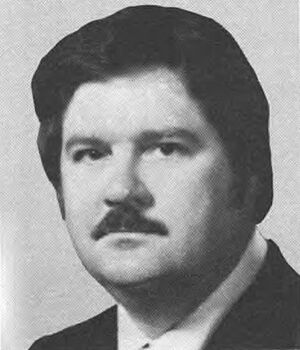Richard A. Tonry facts for kids
Quick facts for kids
Richard A. Tonry
|
|
|---|---|
 |
|
| Member of the U.S. House of Representatives from Louisiana's 1st district |
|
| In office January 3, 1977 – May 4, 1977 |
|
| Preceded by | F. Edward Hébert |
| Succeeded by | Bob Livingston |
| Member of the Louisiana House of Representatives from the 103rd district |
|
| In office January 1976 – December 1976 |
|
| Preceded by | Elmer R. Tapper |
| Succeeded by | Edward Bopp |
| Personal details | |
| Born |
Richard Alvin Tonry
June 25, 1935 New Orleans, Louisiana, U.S. |
| Died | July 3, 2012 (aged 77) Lumberton, Mississippi, U.S. |
| Resting place | St. Bernard Memorial Gardens in Chalmette, Louisiana |
| Political party | Democratic |
| Education | Spring Hill College (BA, MA) Georgetown University Loyola University New Orleans (JD) |
Richard Alvin Tonry (born June 25, 1935 – died July 3, 2012) was an American politician. He was a member of the Democratic Party. He served in the United States House of Representatives for Louisiana's 1st congressional district. He was a representative for a short time in 1977.
Contents
Early Life and Education
Richard Tonry was born in New Orleans, Louisiana, on June 25, 1935. He went to college at Spring Hill College in Mobile, Alabama. He graduated from there in 1962.
Later, in 1967, he earned a law degree. He studied law at Loyola University New Orleans College of Law. After finishing his studies, he worked as a lawyer. He practiced law in the New Orleans area for almost ten years.
Political Career
Richard Tonry started his political career in Louisiana. He was elected to the Louisiana House of Representatives in 1975. This was during the first-ever nonpartisan blanket primary election in the state.
Serving in Louisiana
He served one year in the Louisiana House, from 1976. He represented District 103. While in the state House, he was a strong supporter of workers' rights. He worked closely with leaders of labor unions.
He tried to stop a "right-to-work" bill from becoming law. This bill would have changed rules for workers and unions. Even though he tried, the bill eventually became law.
Moving to Congress
Soon after joining the state House, Tonry decided to run for the United States Congress. The person who held the seat for 36 years was retiring. Tonry ran for the United States House of Representatives in Louisiana's 1st congressional district.
In the first round of voting, he won against another Democrat. Then, in the main election, he narrowly beat Bob Livingston. Livingston was a Republican at the time. This election was one of the last before Louisiana changed its election rules in 1978.
Challenges and Resignation
After serving in Congress for only four months, Richard Tonry faced some problems. There were questions about how his election campaign was run. These issues led to his resignation from Congress.
He admitted to some campaign-related issues. He was sentenced to six months in prison. He served his time at a prison camp in Montgomery, Alabama.
After he resigned, a special election was held in August 1977. Tonry tried to run again in that election. However, he lost in the first round of voting. The seat then went to Bob Livingston, a Republican. This congressional seat has been held by Republicans ever since.
In 1983, Tonry tried to return to the Louisiana House. He ran for his old seat in District 103. But he finished last in that election.
Later Life
Richard Tonry passed away on July 3, 2012. He was 77 years old. He is buried at St. Bernard Memorial Gardens in Chalmette, Louisiana.
See also
- List of American federal politicians convicted of crimes

